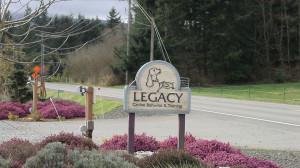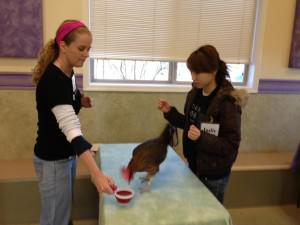 So what does a Chicken Clicker Training Camp have to do with dog trainers, you might ask. Well, if you want to hone your skills as a clicker trainer, a chicken is a good animal to start with. They are small and easy to handle. They are not as biddable and social as dogs are, and don’t really want to interact with you, as a dog would. Dogs are easy to lure or set-up to give you the behaviour you want, chickens not so much.
So what does a Chicken Clicker Training Camp have to do with dog trainers, you might ask. Well, if you want to hone your skills as a clicker trainer, a chicken is a good animal to start with. They are small and easy to handle. They are not as biddable and social as dogs are, and don’t really want to interact with you, as a dog would. Dogs are easy to lure or set-up to give you the behaviour you want, chickens not so much.
Most people have never really interacted with a chicken so their knowledge of chicken behaviour is almost zero, which means you have to purely rely on learning theory and your mechanical skills. They are very quick with their movements, so you have to have you training plan worked out well, as well as your plan B, C, & D. Starting with a chicken that has no behaviours on cue and at the end of the workshop see them navigate an agility course with tunnels, A-frames, wiggle-sticks and cones is truly amazing. Besides teaching them behaviours, we also taught them to discriminate colours and objects.
In March 2013 I was very privileged to have attended a four day Chicken Clicker Training Camp with the wonderful Karen Pryor Academy Faculty Instructor Terry Ryan at Legacy Canine in Seattle, Washington. 
The following article by my fellow chicken camper Terrie Hayward from PAW (from Puerto Rico) – is condensed from the full article “Chicken Camp: What it is, Why I went and what I learned! by Mary Lynch Barbera, PhD, RN, Board Certified Behavior Analyst, 11 June 2012”
Seven simple statements as to how awesome chicken camp is for folks who work with dogs (& people & other animals)!
1) fine tuning reinforcement skills (esp. important with new/difficult behaviors)
2) illuminating the idea of not “luring” or “baiting” but rather reinforcing & rewarding successful approximations
3) recognition re: skill level too high or reinforcement level too low
4) reminding re: length & timing of sessions in order to maximize & plan work appropriately
5) being mindful of physiological issues which may affect performance
6) keeping in mind extraneous/multiple variables when reinforcing & planning training
7) managing time re: content & breaks in order to provide a relaxed & productive training environment

